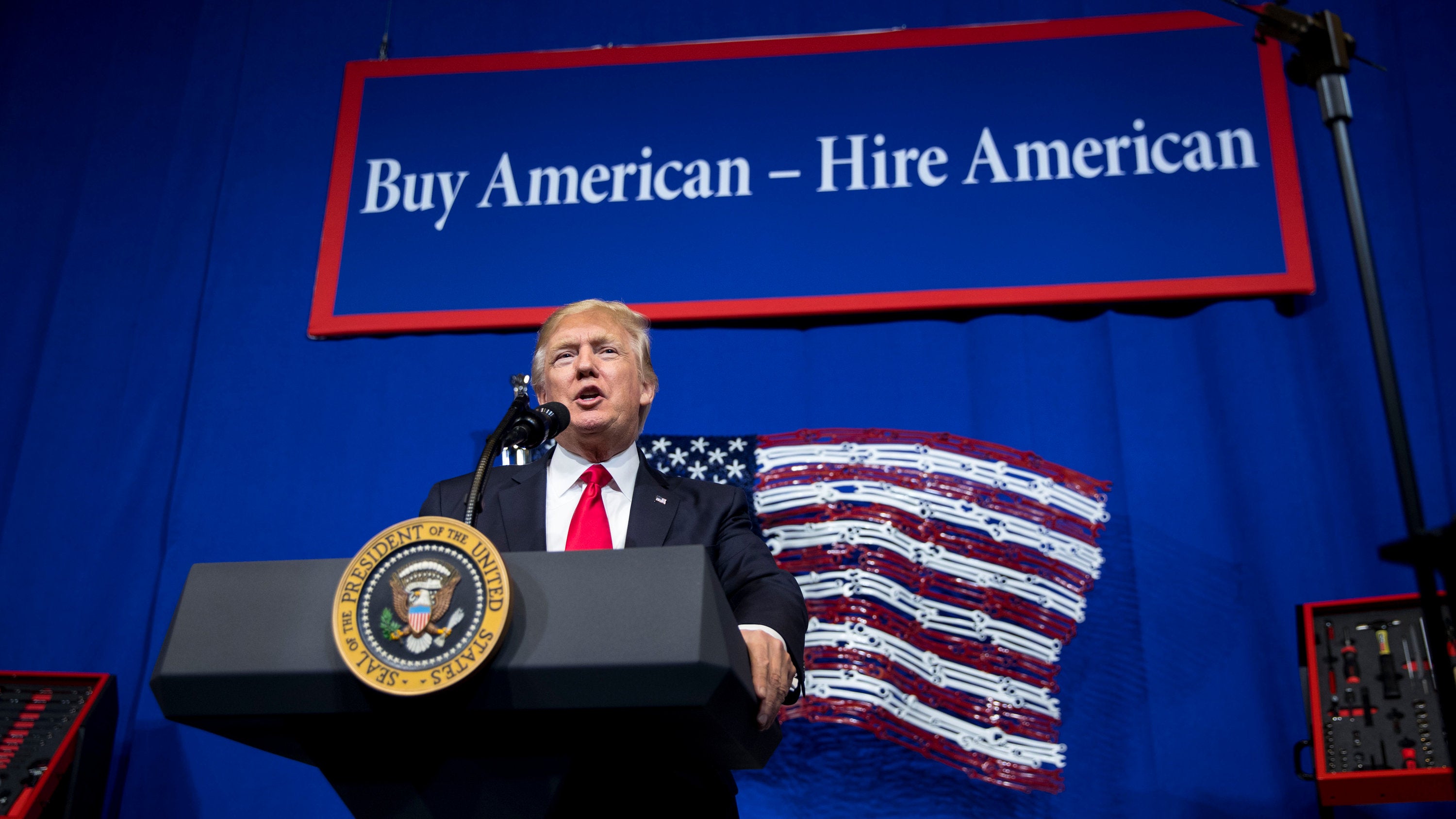Judges Cannot Review Trump's Tariffs, Claims Former President

Table of Contents
Former President Donald Trump's controversial trade policies, particularly his imposition of tariffs, continue to reverberate through the legal and political landscape. A central claim made by Trump, and one that ignited significant debate, is that his tariffs are immune to judicial review. This assertion raises profound questions about the balance of power between the executive and judicial branches, the scope of presidential authority in trade matters, and the future of American trade policy. This article will delve into the arguments surrounding the reviewability of Trump's tariffs, examining the legal foundations of his claim and the counterarguments presented by legal experts and challengers.
Trump's Assertion: Unreviewable Tariffs
Trump repeatedly asserted that his tariffs were impervious to judicial oversight. He maintained that the power granted to the President in trade matters was absolute and beyond the reach of the courts.
- Quote (example, requires sourcing a verifiable quote): "My tariffs are perfectly legal and cannot be challenged in court." (Hypothetical quote - replace with an actual verifiable quote from Trump).
- Specific Tariffs: The claim often focused on the significant tariffs imposed on steel and aluminum imports, as well as those targeting specific countries like China.
- Context: These statements were made across various platforms, including interviews, speeches, and social media posts, frequently during periods of heightened trade tensions.
Legal Arguments Supporting Trump's Claim
Trump’s assertion of unreviewable tariffs rested on two primary legal pillars: the President's broad trade authority and the “political question” doctrine.
The President's Trade Authority
The US Constitution grants the President significant authority over foreign affairs, including trade negotiations. This authority is further augmented by various statutes, granting the executive considerable leeway in implementing trade policy.
- Relevant Trade Laws: Sections within trade acts such as the Trade Expansion Act of 1962 (and subsequent amendments) grant the President broad powers to negotiate and implement trade agreements, often including the imposition of tariffs.
- "Plenary Power" Argument: Supporters of Trump's claim often invoked the concept of "plenary power," arguing that the President's authority in trade is essentially complete and unfettered by judicial interference unless explicitly limited by statute.
- Relevant Supreme Court Cases: While no Supreme Court case directly addresses the complete unreviewability of tariffs, precedent on presidential power in foreign affairs provides a basis for arguments supporting expansive executive authority in trade. (Cite relevant Supreme Court cases here, if applicable).
The "Political Question" Doctrine
The "political question" doctrine is a judicially created doctrine that prevents courts from adjudicating certain issues deemed inherently political and better left to the political branches of government. Proponents of Trump's position argued that tariff decisions fall under this doctrine.
- Definition and Criteria: The political question doctrine generally applies when a matter involves a decision committed to another branch of government, lacks judicially manageable standards, or would risk undermining the separation of powers.
- Tariff Decisions as Political: Tariff imposition involves complex economic and foreign policy considerations, making them inherently political in nature. The argument is that courts lack the expertise and authority to second-guess these decisions.
- Non-Justiciability: If a tariff dispute is deemed a "political question," it becomes non-justiciable, meaning courts refuse to hear the case.
Counterarguments and Legal Challenges to Trump's Tariffs
While Trump asserted the unreviewability of his tariffs, numerous legal challenges were filed, contesting his actions on various grounds.
Challenges Based on Constitutional Grounds
Some legal challenges argued that the tariffs violated specific provisions of the US Constitution.
- Constitutional Clauses: Challenges cited potential violations of the Due Process Clause (Fifth Amendment), arguing that the tariffs imposed unfair burdens on specific businesses and industries without adequate process. Equal Protection claims (Fourteenth Amendment) were also raised, alleging discriminatory treatment of certain foreign entities.
- Arguments Presented: These challenges argued that the tariffs, despite the President's broad trade authority, were not applied fairly or in accordance with due process.
- Court Decisions: (Note relevant court decisions here, highlighting outcomes and reasoning).
Challenges Based on Statutory Grounds
Other legal challenges contended that the tariffs violated existing trade laws.
- Relevant Statutes: Challenges focused on arguments that the tariffs exceeded the authority granted under specific trade statutes, or that the President failed to follow mandated procedures before imposing them.
- Legal Arguments: These challenges argued that even within the bounds of executive trade authority, there are limitations imposed by Congress through trade laws that Trump’s tariffs violated.
- Court Decisions: (Note relevant court decisions here, highlighting outcomes and reasoning).
Implications of the Unreviewability Claim
Trump’s claim regarding the unreviewability of his tariffs has significant implications for future trade policy and the balance of power between the executive and judicial branches.
- Impact on Trade Negotiations: The assertion raises concerns about the future of trade negotiations and agreements, as it could embolden future administrations to act unilaterally without fear of judicial oversight.
- Unchecked Executive Power: Allowing unchecked executive power in trade matters could significantly undermine the rule of law and the checks and balances inherent in the US system of government.
- Effect on Judicial Oversight: The debate highlights the crucial role of judicial review in maintaining accountability and ensuring that even executive actions within seemingly broad authorities are consistent with the Constitution and existing laws.
Conclusion
The debate surrounding the reviewability of Trump's tariffs remains a complex and pivotal issue in US trade law and constitutional jurisprudence. While Trump maintained that judges lacked the authority to review his tariffs, numerous legal challenges were filed, based on constitutional and statutory grounds. The implications of this debate extend far beyond the specific tariffs imposed by the former President, reaching the core principles of executive power, judicial review, and the rule of law in trade policy. Stay informed about ongoing legal challenges to presidential trade policies and the implications of judicial review (or lack thereof) regarding future Trump tariffs and other trade actions. Follow our site for updates on this developing legal battle and related trade policy discussions.

Featured Posts
-
 Lotto Plus 1 And Lotto Plus 2 Draw Results Check The Numbers
May 03, 2025
Lotto Plus 1 And Lotto Plus 2 Draw Results Check The Numbers
May 03, 2025 -
 Un Violon A L Ecran La Matinale Avec Mathieu Spinosi
May 03, 2025
Un Violon A L Ecran La Matinale Avec Mathieu Spinosi
May 03, 2025 -
 Une Rencontre Inattendue Au Vatican L Histoire Entre Trump Et Macron
May 03, 2025
Une Rencontre Inattendue Au Vatican L Histoire Entre Trump Et Macron
May 03, 2025 -
 Play Station Showcase 2024 Ps 5 Fans Two Year Wait Almost Over
May 03, 2025
Play Station Showcase 2024 Ps 5 Fans Two Year Wait Almost Over
May 03, 2025 -
 Are School Suspensions An Effective Discipline Strategy A Deeper Look
May 03, 2025
Are School Suspensions An Effective Discipline Strategy A Deeper Look
May 03, 2025
